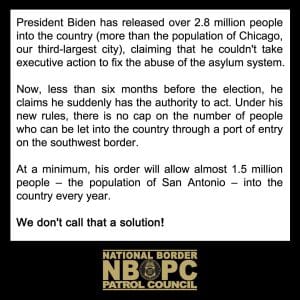Donald R. Stakes
Director Labor Management Relations
U.S. Customs and Border Protection
1400 L Street NW Washington DC 20229
Subject: Sequestration
Dear Mr. Stakes,
On Feb. 19,2013, CBP provided notice of its intent to furlough all CBP employees for up to 14 work days and to reduce overtime compensation by decertifying all Border Patrol Agents (“BPAs”) who had been authorized to work Administratively Uncontrollable Overtime (AUO). These proposed actions constitute changes in the employee’s conditions of employment.
In a Feb. 25, 2013 letter, the National Border Patrol Council (“NBPC”) demanded to bargain over CBP’s sequestration plan, including, but not limited to the plan to furlough employees and decertify all BPAs for AUO. In addition to listing a number of initial bargaining positions, NBPC requested information needed to forward its proposals. Although the agency has not yet responded, NBPC was forced to set a bargaining date because the agency had unilaterally and inappropriately begun to implement its proposals. You and I have agreed to commence bargaining on Tuesday, March 19,2013, and you have further agreed to exert your best efforts to provide me with our previously requested information prior to the start of bargaining.
As you know, CBP has a duty to bargain — on a pre-implementation basis — with the NBPC over its proposals to impose furloughs and to decertify BPAs for AUO. While we recognize that CBP has the right to determine whether furloughs will take place, its rights are limited because it is seeking to impose administrative as opposed to emergency furloughs. As such, CPB must bargain with NBPC over, among other things, the procedures by which furloughs will be implemented, the timing and method by which furlough hours will be imposed on employees, the employees or groups of employees that will be furloughed or exempted from furloughs and the appropriate arrangements for employees who may be adversely impacted by furloughs. All such bargaining must be conducted prior to the implementation of furloughs. See e.g. Department of the Air Force, Scott Air Force Base and National Association of Government Employees, Local R7-23, 19 FLRA 136 (1985).
Despite CBP’s obligation to participate in pre-implementation bargaining and despite the fact that we have set March 19 as the start date for such bargaining, CBP began unilaterally sending out furlough notices to employees last week even though the wording of such notices are themselves subject to pre-implementation bargaining. NBPC is now demanding that CBP cease and desist from such activity and that it rescind its furlough notices until such time as the parties have agreed to the wording to be used in such notices. At this early date, CBP can rescind the notices with no diminishment in its ultimate ability to impose furlough days since more than half of the current fiscal year remains in front of us. However, if CBP refuses to rescind the current notices, it could be disastrous if a third-party authority reversed the subsequently imposed furlough days.
In a similar vein, Thomas S. Winkowski, CBP’s Acting Chief Operating Officer, has directed CBP’s Office of Human Resources Management (HRM) via memorandum to begin the process of de-authorizing the payment of AUO for all employees currently authorized to receive it. The effective date of the AUO decertification is April 7, 2013. NBPC questions Mr. Winkowski’s legal authority to de-authorize the payment of AUO and it therefore requests any and all documents that provide the authority for the Acting Chief Operating Officer to decertify Border Patrol Agents for AUO.
CBP’s proposal to decertify Border Patrol Agents from AUO or to otherwise deauthorized the payment of AUO for Border Patrol Agents, due to sequestration or otherwise, is equally subject to pre-implementation bargaining. See, e.g. U.S. Customs Service, Northeast Region and National Treasury Employees Union, 20 FLRA 190 (1985). While we again recognize that CBP may have the right to assign work, including overtime, appropriate arrangements for employees who will suddenly lose a substantial portion of their normal pay, along with the procedures by which AUO is computed and paid are subject to preimplementation bargaining. See, e.g. National Border Patrol Council and U.S. Immigration and Naturalization Service, 23 FLRA 106 (1986). As such, NBPC believes that CBP’s current, prebargaining efforts to decertify BPAs for AUO is premature, not consistent with the requirements of the Statute and the CBA and should be immediately terminated.
Furthermore, NBPC has serious reservations and concerns about any decision to decertify BPAs for AUO, even under the extreme circumstances of sequestration. Nothing has changed, or will change, in regards to the amount of work or number of hours of work that BPAs are required to perform each day to secure out nation’s borders and to keep the American public safe. NBPC firmly believes that any move to end AUO for BPAs will have immediate and serious consequences for the integrity of our nation’s borders and for the sovereignty of the United States. Such a step would substantially erode and in some cases terminate an agent’s ability to detect and arrest aliens, smugglers and other criminals, including terrorists, who use the border area to further perpetuate their often violent and unlawful schemes. Without AUO, there will be fewer BP As available to patrol the border on any given shift and aliens, gun-runners and drug smugglers will quickly learn and begin to exploit the vulnerabilities directly caused by CBP’s decision to decertify BPAs for AUO. Without a doubt, the end of AUO would result in vast areas of the United States being unpatrolled and thus ceded to the control of criminal cartels, bandits and smugglers with all of the attendant crime that follows their activities.
Accordingly, NBPC reiterates its previous demand to bargain over any and all matters relating to CBP’s sequestration plans, including, but not limited to, its proposals to furlough employees, to decertify BPAs for AUO or to otherwise de-authorize the payment of AUO to
BP As. NBPC further insists that CBP promptly furnish NBPC with the information it previously requested, including a copy of its sequestration plan, so that NBPC may further develop and perfect its negotiable proposals and engage in a meaningful dialogue with CBP during the upcoming bargaining scheduled to commence on March 19, 2013.
NBPC also demands and insists that CBP immediately cease and desist with any further implementation of its sequestration plans, or with implementing any other measure that result in a change to employees’ conditions of employment until such time as CBP has fully and completely satisfied its duty to bargain with the NBPC over all such matters.
Download a copy of this letter.
Download a copy of the initial NBPC Demand to Bargain that was filed on February 25th


